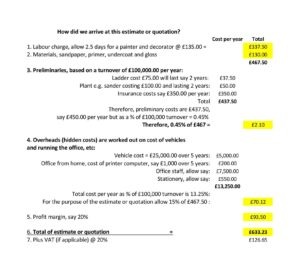- Home
- About Us
- Member Profiles
- Help and Advice
arrow_drop_down
- Conciliation
arrow_drop_down
- Guild magazine
An estimate or quotation?
 In this article we take a look at one of the most important aspects of a business: that of an estimate or quotation.
In this article we take a look at one of the most important aspects of a business: that of an estimate or quotation.
The difference
There is little or no difference between an estimate or quotation. It is the information provided by your potential client to prepare the estimate or quotation that counts.
In general, an estimate is a guide to what the price might be, whereas a quotation is a fixed price for the work.
If a detailed description is given for a job such as: ‘prepare, prime bare timber, apply two undercoats and one full coat of gloss to timber external door, frame, stop and architrave’, it does not matter if you call it an estimate or a quotation. The information is there to price the work accurately.
Pricing
There are several different elements to pricing the work, as follows:
- The cost of labour to include the number of hours or days to complete the work.
- The cost of materials.
- Preliminary costs such as ladders, scaffolding, skips, plant and insurances.
- Overhead costs should include running an office and vehicles and time spent preparing estimates and quotations. You should work out the yearly cost set against the company turnover to arrive at a percentage for overheads. This is generally between 10% and 15%.
- Profit margin. You need to understand your accurate cost for a project and decide what percentage profit you require. This can be between 15% and 20%.
Some thought and consideration needs to go into working out an estimate or quotation.
 Procedure
Procedure
Arrange to visit the premises where the work is to be carried out. A visit will confirm if you:
- Are able to park nearby with or without cost.
- Can deliver a skip without difficulty and whether a licence and lighting are needed.
- Can access the rear without restriction e.g. does a gate need to be removed?
- Need to work at high level e.g. perhaps several floors up, if in a flat.
- Have access to water and electricity.
All the above aspects have a cost implication and should be included in your estimate or quotation.
Preparing the estimate or quotation
For the purpose of this exercise we are going to prepare an estimate or quotation. The job is to redecorate 2 external softwood doors:
The estimate or quotation should include a full breakdown of the work involved. It should take into account the items mentioned under ‘Procedure’ as well as those set out below.
- To include protection over internal and external surfaces and finishes.
- To prepare all timber work to existing external doors to include frame, stop and architraves. Remove all ironmongery prior to preparations (protecting hinges where necessary).
- Apply primer to bare wood.
- Apply two coats of undercoat and one full coat of gloss to both sides of external doors, frame, stop and both sides of architraves. Paint to be used is Dulux Weathershield (water based).
- Replace all existing ironmongery.
All for the sum of £633.23 plus VAT at 20%
 This estimate does not include the following:
This estimate does not include the following:
- Removal of all existing well adhered paint.
- Replacement ironmongery.
- New draught excluder.
- Removal of all household good in the immediate area. This will remain the responsibility of the occupier.
The overall work will take approximately 2.5 days. This estimate or quotation remains available for 30 days.
As far as the profit margin is concerned, it is your decision what percentage profit you require.
Do not forget to include your Terms of Payment.
Consumer Contracts Regulations 2013:
Remember to include within your estimate or quotation a clause providing for a 14-day cooling off period. During this period your possible client can withdraw from having the work carried out.
Also include a form on your estimate or quotation if your client wants to proceed within the 14 days. Ask them to sign and date their agreement on that form.
The Consumer Rights Act 2015:
This Act indicates that the work must be to a reasonable standard and fit for purpose, carried out within a reasonable time, and at a reasonable cost.
For further information on either of the above Regulations and Acts, please visit the website: www.citizensadvice.org.uk.
We trust that this has been a useful article for our members to understand the importance of estimates and quotations.

